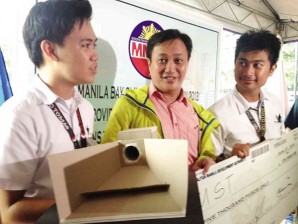
MMDA Chair Francis Tolentino (center) congratulates UST students John Abao (right) and Ariel Manalaysay who is holding a scale model of their winning entry. Photo by Jaymee T. Gamil
What better way to clean up a polluted bay than with a giant dustpan?
This was the simple premise for an engineering design plan drawn up by two University of Sto. Tomas (UST) students who won the Manila Bay Cleanup competition launched by the Metropolitan Manila Development Authority (MMDA) in April.
The contest challenged students to come up with “innovative engineering solutions to the Manila Bay garbage problem” which may end up being adopted by the MMDA.
In the awarding ceremonies held on Friday, the entry of senior electronic communications engineering students John Beljoe Abao and Ariel Manalaysay bested 11 others submitted by students from different schools in Metro Manila.
The duo received a P25,000 cash prize on top of an additional P5,000 for reaching the finals.
Their design involved the construction of concrete v-shaped seawalls with a tube in the center which leads to an underground garbage containment tank.
The design relies on “big waves” or a strong tidal force to sweep floating debris against the wall, into the chute and down the containment tank where the accumulated garbage could later be extracted by the bulk.
Abao said the “simple logic” was based on sheer imagination.
During the presentation of the six finalists on Friday afternoon and in front of the judges composed of representatives from the MMDA, the Departments of Public Works and Highways, Department of Science and Technology and the Manila City government, Manalaysay described their design as “a dustpan that collects the trash into a bin.”
From the tank, the garbage could be harvested through a net or through the DPWH’s “scraper” which is already in use, Abao said.
“It is made of concrete so it can withstand natural calamities. Its simple design makes it easy to implement. It’s low in maintenance because it has no moving parts or automation. The only manual labor required is during extraction,” Abao said, citing the benefits of their design.
He admitted, however, that the design was limited when it came to “treatment” of the chemicals in the water.
Public Works Assistant Secretary Maria Catalina Cabral, who led the panel of judges, said that in choosing the winning design, they looked for “innovation and engineering.”
The entries were judged according to innovation (60 percent), implementation feasibility (30 percent) and clear presentation of the idea (10 percent).
“The concept is doable. We saw there was potential for this to be built and developed. The MMDA and DOST will make more studies to develop and make more improvements on this proposal,” Cabral said of Abao and Manalaysay’s winning entry.
The panel of judges made several suggestions after the two presented their design, including using steel reinforcements, making the structure “collapsible” and transferrable instead of permanent. Another suggested that a flap check valve be placed at the mouth of the chute to prevent debris from going back out.
Overall, however, Cabral was impressed by ideas which came from the contestants. “The youth today are truly skilled. When you graduate, you’re welcome to apply at government agencies,” she told them before she announced the winning design.
The other finalists included a proposal to use biosorbents—
“biological materials that are known to remove heavy metals from the environment”—made by Ateneo de Manila University students; “The Flushmaster” and “The Groovemaster” which mechanically sucks or scoops out floating garbage into a containment barge designed by students of the University of
the Philippines-Diliman; the Manuel L. Quezon University students’ V-shaped River Gate Fence which traps floating trash at the sides of the river, and the Mapua Institute of Technology students’ Clean Bay Rover.
MMDA chair Francis Tolentino said he was pleased by the youth participation. “It only showed their concern to help address our environmental problems,” he noted.